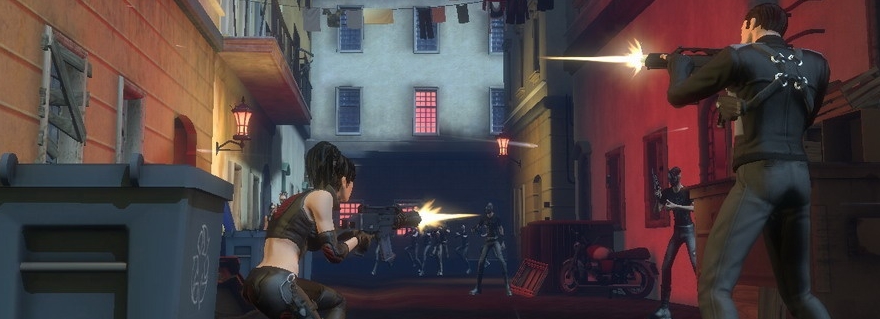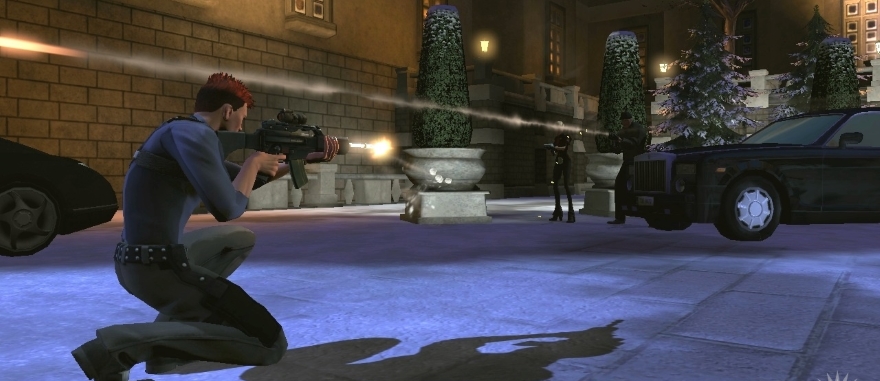
The graveyard of Sony Online Entertainment and Daybreak Game Company is certainly full enough to be considered a threat if there was ever a zombie uprising among MMORPGs. From PlanetSide to Free Realms, there are plenty of live games that were disposed of in this grim fictional burial ground. But there are also those stillborn titles that never had the change to make or break in a live environment. EverQuest Next might be the most fresh in our minds, but go back a handful of years and you might have seen players lamenting the loss of a different promising SOE game: The Agency.
The Agency seems like a natural fit for the studio’s focus on first-person shooters and a willingness to branch out from strictly fantasy territory. Instead of dragons or stormtroopers, players in this game were to face off against terrorist organizations and dastardly spy agencies, all in the pursuit of living out the ultimate James Bond fantasy.
But instead of sitting on our desktop, The Agency exists only in a forgotten corner of this imaginary cemetery. Today, let us tenderly brush off its worn tombstone and remember what we can about this canceled spy shooter.
Formal wear not required
Teased in early 2007, The Agency was officially announced by SOE in June as a free-to-play persistent online shooter in development for both Windows and the PlayStation 3. Players’ imaginations were sparked at the thought of a game that took them to the far-flung reaches of the globe for all sorts of secret agent work, including assassination, tailing suspects, sabotage, and undercover detective work in one of two agencies (UNITE and ParaGON).
“”We worked to create a world where adults live out their fantasy of being an elite super agent,” SOE President John Smedley explained in an 2007 interview. Smedley went on to say that the theme and business model were created in hopes of roping in more hardcore gamers than the studio had at the time.
While SOE promised that The Agency was a shooter that respected the “headshots actually kill instantly” rule, the game was to branch out into more RPG elements as a type of hybrid title. Players would level up skills and gradually develop an operative network to gain access to new missions and gear. Operatives were portrayed as trading cards that could be swapped between players and exchanged on the auction house.
Instead of choosing a class, operatives in the game simply had to don a different set of gear for a specific task at hand. After all, you wouldn’t wear the same set of clothes for a stealthy undercover mission as you would to a full-frontal assault in real life, so why would you do that in games? Six “specializations” with specific outfits were in place to offer a variety of game roles.
Become Jennifer Garner
Another intriguing concept in this game was the alias system. The idea is that in spy thrillers, there is always a part where the character has to go undercover and unnoticed. Players would don their “alias” identity for certain parts of missions and attempt to navigate stages without attracting much attention (they would have a “stare meter” instead of a health meter to show how much the NPCs were noticing that character).
Both PvP and co-op PvE were in the design documents for the game, with the latter offering players the chance to team up for multi-step missions. The Agency had the lofty goal of offering a variety of tech and vehicles to incorporate into its quests. Taking a helicopter part of the way before rappelling down for some footwork and then finishing off with a car chase was all part of the plan.
During missions, players would encounter special “Agency moments” that offered special set pieces with bonus objectives. These didn’t have to be done, but if players could pull off tricky moves in the heat of the moment, they would be rewarded with a thrilling visual, a higher mission grade, and some extra goodies.
Gunplay was certainly a large part of the action, but The Agency wanted players to be more than mindless trigger-happy goons. The devs worked hard to include a lot of cool toys that could be combined in MacGuyver fashions to get the job done. Have guards standing under a water pipe? Figure out a way to boil the water, and the guards could be dealing with a face full of steam as a distraction. I also liked the mention of a martini bomb that could freeze enemies (shaken AND stirred).
Consensual PvP between the game’s dual factions was supposed to keep the competitive players happy. PvP arenas were mentioned, although open world PvP servers never got the official word.
The Agency wouldn’t be non-stop missions and fighting. SOE had teased fans with a variety of minigames, such as a casino-style Texas Hold ‘Em that could even play into the stories. Fail or succeed at a game too many times, and certain NPCs might take notice and interact with you. There was also mention of playable arcade cabinets — games within the game. Photography and player housing were hinted at during development, although SOE never elaborated on those systems.
As the shooter was being developed simultaneously for PC and console, the team made a concerted effort to keep the interface as clean and streamlined as possible. This certainly wasn’t to be an EverQuest II-style of UI, with dozens of skills and plenty of frames.
Marked for death
As players waited to get their hands on the game, SOE launched a Facebook app in mid-2010 called The Agency: Covert Ops that offered a social experience that would introduce people to the world being developed. Stories and combined player efforts were at the heart of the app — an “interactive spy novel,” in other words.
While The Agency continued to see positive press coverage over the years, particularly at conventions, a beta and launch seemed to never come. In December 2010, Smedley announced that the game wouldn’t be coming out until the latter half of 2011.
Sadly, none of this was meant to be. On March 31, 2011, Sony Online Entertainment announced that it would be closing three of its studios and laying off a third of its workforce, including the Seattle branch that was responsible for The Agency. The studio issued the following statement:
As part of a strategic decision to reduce costs and streamline its global workforce, SOE announced today that it will eliminate 205 positions and close its Denver, Seattle and Tucson studios. As part of this restructuring, SOE is discontinuing production of The Agency so it can focus development resources on delivering two new MMOs based on its renowned PlanetSide and EverQuest properties, while also maintaining its current portfolio of online games.
In late 2013, Smedley was asked about the possible resurrection of The Agency, which he shot down. “The thing about games like [The Agency] is, it’s hard to bring them back when you lose momentum on a project,” he said. “It sounds good, but games are sort of an idea you have at the time. You’re lucky if you can keep the vision long enough to get them launched. And then, if the fans love it, then you can have something after launch, too.”
Hand-in-hand, the MMO and its studio were shut down, and an intriguing title became nothing more than a “could have been.”
 Believe it or not, MMOs did exist prior to World of Warcraft! Every two weeks, The Game Archaeologist looks back at classic online games and their history to learn a thing or two about where the industry came from… and where it might be heading.
Believe it or not, MMOs did exist prior to World of Warcraft! Every two weeks, The Game Archaeologist looks back at classic online games and their history to learn a thing or two about where the industry came from… and where it might be heading.















